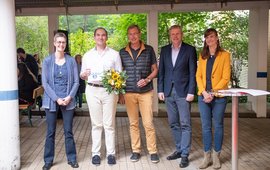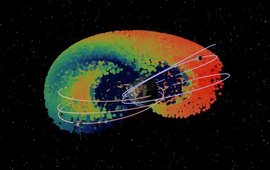Overview
The near-Earth space environment is hazardous and poses a significant risk for satellites and humans in space. Currently, there are hundreds of operational commercial satellites with a revenue stream of tens of billions of dollars per year. There are also a number of other satellites that assist in navigation, weather prediction, and telecommunication. Frequent satellite failures caused by space weather have fueled a surge in interest with specification and prediction of space weather during the last decade.
Our section is working on understanding of the dynamical evolution of the hazardous space radiation environment and developing the tools for specification and prediction of the adverse effects of space environment using models and data assimilation. We study fundamental processes in the near-Earth environment and focus on understanding fundamental processes responsible for the evolution of space radiation. Our research will help safely design and operate satellites and maintain ground networks. In our research we try to bridge our theoretical studies with high performance computing to develop tools that can be used by engineers.
Below you can find more details on the main areas of research in our section:
Job Offers
The following positions are currently available in Section 2.7 "Space Physics and Space Weather":
PhD position (f_m_x) - Numerical modelling of electron flux decreases during geomagnetic storms









![[Translate to English:] Illustration Machine Lerning](/fileadmin/_processed_/2/0/csm_Image_ML_website_GFZ_970214e70b.png)



![[Translate to English:] Logo Workshop IMC-IV](/fileadmin/_processed_/b/e/csm_Logo-IMC-IV_b82255a544.jpeg)
![[Translate to English:] Dedong Wang visiting Cité de l’Espace](/fileadmin/_processed_/7/4/csm_ERC-Grant_Dedong-Wang_57e95b6428.webp)







